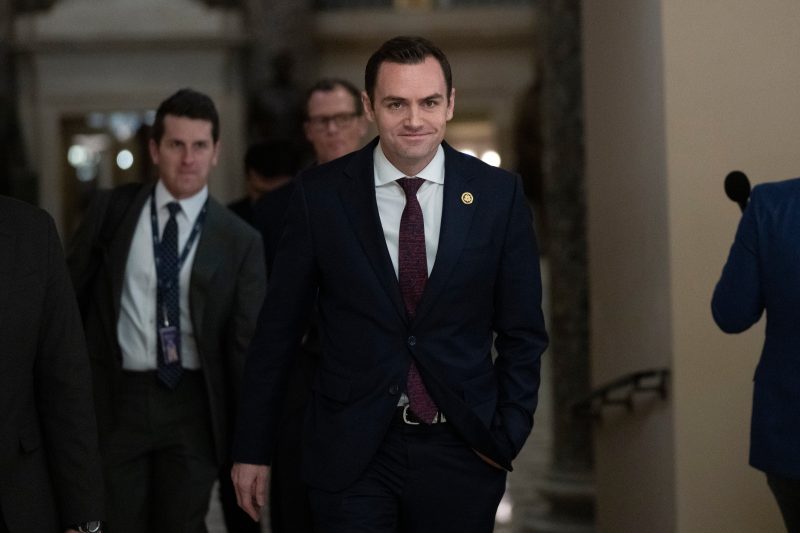Biden’s EPA pushed to ‘de-gender’ agency bathrooms, hire more LGBTQ staff, unearthed memo reveals
In chaotic scene, Republicans argue with GOP lawmaker after ‘no’ vote on impeachment


Moments before the vote to impeach Homeland Security Secretary Alejandro Mayorkas narrowly failed Tuesday evening, a chaotic scene unfolded on the House floor.
The vote had unexpectedly come to a tie after three Republican lawmakers bucked party lines to vote against the measure. Two of those lawmakers — Reps. Tom McClintock (R-Calif.) and Ken Buck (R-Colo.) — had previously said publicly that they would not support the measure, citing lack of evidence that Mayorkas had committed high crimes and misdemeanors. But a third, Rep. Mike Gallagher (R-Wis.), had stayed mum about how he would vote, hours after warning his GOP colleagues behind closed doors that impeaching the first cabinet secretary in 150 years would open “Pandora’s Box.”
Gallagher ultimately voted no, which Republican leaders accepted since they could lose three votes to launch the first impeachment of the 118th Congress. But minutes later, the vote arrived at a 215-215 tie, an unexpected turn of events that stunned the House floor into a standstill.
Soon, the Wisconsin Republican was swarmed on the House floor by his colleagues, who engaged in an apparent last-ditch attempt to change his mind. Rep. Marjorie Taylor Greene (R-Ga.), who has tried multiple times to force the House to expedite impeaching Mayorkas, was spotted shouting at Gallagher. She was soon joined by Rep. Mark Green (R-Tenn.), the chairman of the Homeland Security Committee who spearheaded the investigation into Mayorkas. Rep. Jodey Arrington (R-Tex.), a close ally of Speaker Mike Johnson’s (R-La.), then animatedly tried to persuade Gallagher to flip his vote as Rep. Dusty Johnson (R-S.D.) listened in.
As the vote stayed open after time had expired, Democrats shouted “Order! Order” in unison to bring the tied vote to a close. Gallagher stood listening with his arms folded across his chest as he intermittently gesticulated and shook his head. He was unmoved.
In a telling sign that Republican leaders had accepted the defeat, Rep. Blake D. Moore (R-Utah), the vice chairman of the GOP conference, approached the lectern and changed his yes vote to one against the measure — a procedural move that allows Republican leadership to bring the measure up for a vote again at a later date when their majority is in full attendance.
The original tie vote nearly had not happened, thanks to minor drama involving another lawmaker named Green: Rep. Al Green (Tex.) was the lone Democrat to miss a less-consequential vote to extend commissions for the Chesapeake and Ohio Canal National Historical Park that had taken place before the Mayorkas impeachment vote. His absence, coupled with that of Majority Leader Steve Scalise (La.) on the GOP side, allowed Republicans to lose three members and still be able to green-light impeaching Mayorkas.
One of Green’s closest friends, Rep. Emanuel Cleaver II (D-Mo.), told The Washington Post in an interview that he realized Green had been gone for the first vote and might be the difference in the margin. He called the Texan — twice — at 6:13 p.m., according to his phone’s call logs.
“I panicked,” Cleaver said.
But Green showed up in the chamber at the last minute — in a wheelchair following a medical procedure — and cast his vote, tying it at 215 and sending Republicans into a full scramble. The measure to impeach Mayorkas failed on a 214-216 vote, a stunning rebuke of a months-long investigation into Mayorkas that legal experts and even some Republicans had raised concerns about.
House Republicans knew they were in trouble ahead of Tuesday evening’s vote. Their razor-thin majority and the unpredictability of absences had always played a factor into whether they could successfully impeach Mayorkas. But after working several Republican holdouts, including Reps. David Joyce (R-Ohio) and Patrick McHenry (R-N.C.) — who played coy on how they would vote — Republican leaders were confident the vote would pass.
But signs of trouble appeared shortly after the vote series started, when Johnson walked onto the House floor followed by Gallagher as the vote on the non-controversial provision was kept open for an extended period of time — an effort to buy GOP leaders time to sway holdouts. The speaker immediately huddled with his senior staff. Majority Whip Tom Emmer (R-Minn.) and his chief of staff joined in. Emmer then dashed across the Republican side of the House floor to find Buck, speaking with him at length.
Emmer then darted back to speak with Joyce as Johnson, still huddling with a now-larger group of staff, kept looking behind his shoulder for Emmer to signal the latest status of how their colleagues would vote. Johnson then broke from the group, put his finger in the air and circled it, signaling to Rep. Jake Ellzey (R-Tex.), who was overseeing the floor, to call the first vote and tee up the Mayorkas vote.
It devolved from there.
Republicans watched in disbelief that they had, again, failed to follow through a promise they had long touted because of their razor-thin majority. They walked off the floor in shock, anger, or expressing no surprise at what happened after living through a year of precedent-breaking historic moments driven by their ideologically fractious conference.
Some Republicans began pinning the blame on their leadership team for failing to consider the last-minute surprise by Democrats. How did they not know, or at least operate under the assumption, that Democrats could bring their entire caucus to the floor in a show of unity?
Rep. Steve Womack (R-Ark.), a conservative institutionalist, said Republicans need to whip votes better and “not to get out ahead of our skis and put something on the floor that we don’t have certainty on.”
“You gotta know where your votes are before you take to the floor so we wouldn’t be embarrassed,” said Rep. Ralph Norman (R-S.C.), a member of the House Freedom Caucus.
Having heard that Republicans were complaining about their vote count operation, Minority Whip Katherine Clark (D-Mass.) told The Washington Post she would “take that as a high compliment on behalf of our caucus.”
“We’re going to continue to show the American people that we’re here to govern for them, and that this chaos and dysfunction and extremism isn’t going to win,” she added.
Later Tuesday night, Gallagher released a statement defending his vote, signaling he was unlikely to change his support if the motion was brought to the floor again.
“Creating a new, lower standard for impeachment, one without any clear limiting principle, won’t secure the border or hold [President] Biden accountable and will set a dangerous new precedent that will be weaponized against future Republican administrations,” he said.
Shortly after the vote, Johnson devoted ample time to speak with the longest serving Republican in the House, Rep. Hal Rogers (R-Ky.). Rogers was recently hospitalized after a car accident, missing two weeks of votes to recover, but appearing this week in a full neck and chest brace to vote to impeach Mayorkas.
Walking off the House floor after another vote on a measure he proposed to fund Israel failed, Johnson simply said “yes” when asked if he would bring the Mayorkas impeachment vote back up once enough Republicans were present to vote. Asked what he would do to win over the three no votes, Johnson ignored the question, but Rep. Joe Wilson (R-S.C.) cheekily said “pray.”
Paul Kane and Theodoric Meyer contributed to this report.











